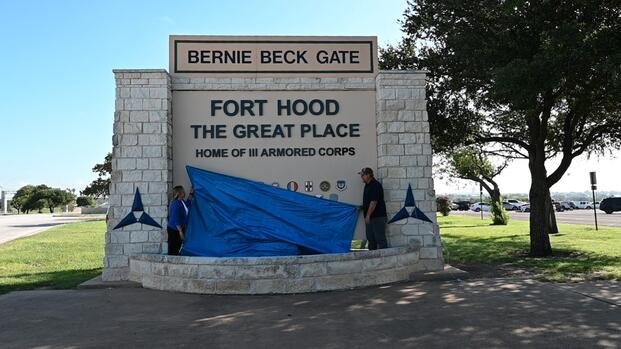Jane Does in Fort Hood Sexual Abuse Case File Complaints Against Army, Pentagon

A law firm has filed seven legal complaints against the U.S. Army and Pentagon, one for each of seven victims sexually abused or non-consensually videotaped by a doctor at Fort Hood.
The U.S. Army Office of Special Trial Counsel (OSTC) on Dec. 9 announced that it had preferred four charges and 61 specifications[1] against Maj. Blaine McGraw, 47, an obstetrician gynecologist who was assigned to the Carl R. Darnall Army Medical Center located in Fort Hood, Texas. The OSTC conducts independent oversight and prosecution of murder, sexual assault, domestic violence, child abuse, kidnapping and other serious criminal offenses.
McGraw is charged with 54 specifications for indecent visual recording, five specifications of conduct unbecoming an officer, one specification of willful disobedience of a superior officer, and one specification of making a false official statement in violation of multiple articles of the Uniform Code of Military Justice.
“In accordance with current policies, we do not comment on pending or ongoing litigation,” an Army spokesperson told Military.com[2] on Monday.
The Army alleges that McGraw's purported crimes occurred on multiple occasions between Jan. 1, 2025, and Dec. 1, 2025. They said the majority of the alleged offenses occurred during medical examinations with female patients at the Fort Hood medical center. Another victim who was not a patient was also secretly video recorded at a private residence off-post near Fort Hood.
McGraw’s alleged actions were first being investigated by the Army in late October, when his name had not yet been made public. At the time he was described only as a suspended doctor who was no longer performing services for patients.
The Army last said there are 44 victims in this case but the exact number could be higher.
More Charges Are Possible
The law firm Sanford Heisler Sharp McKnight on Monday filed seven Federal Tort Claims Act (FTCA) administrative complaints[3] against the Army, the Defense Health Agency, and the Department of Defense on behalf of seven Jane Does—all of whom were purportedly impacted by McGraw’s actions in Fort Hood and at the Tripler Army Medical Center in Honolulu, Hawaii.
Christine Dunn, co-managing partner of the national civil rights and public interest law firm, and two others are representing the victims.
“I think [the charges so far announced against DeGraw are] probably just the beginning,” Dunn told Military.com[4]. “I would expect there would likely be more charges. I don't think that the current set of charges encompasses the full range of his criminal conduct so I will not be surprised if more charges are coming.”
FTCA complaints commence after individuals file an administrative complaint with the agency at fault. In turn, that agency is afforded at least six months to investigate the claim. Once that time period expires, an individual can file a lawsuit against the agency in federal court.
Two Army Doctors, Two Similar Cases
A case like this is not new to Dunn, the co-chair of her firm’s Sexual Violence, Title IX, and Victims’ Rights Practice Group. She has also represented 45 victims and filed tort claims on their behalf in a case involving another Army doctor, Maj. Michael Stockin, 39, who previously pleaded guilty to sexually abusing male servicemembers.
On Jan. 15, 2025, Stockin was sentenced to 164 months in prison by a military judge at the Cascade Court Complex, Joint Base Lewis-McChord, Wash. He was dismissed from the Army, lost his medical license, and was forced to forfeit all pay and allowances.
“In the [Stockin] case…they rolled them out, the charges,” Dunn said. “I think three different rounds of them, so I won't be surprised to see something similar here. I said this in my last case, I will say it here too, that I am glad that [McGraw] is facing charges and that I hope that he will be dealt with adequately in the criminal process.”
"This isn't just the story of a rogue doctor, it's also the story of an institution that failed these patients.”
“But also, the Army's involved here, too. That's where I come in, to try and hold the Army accountable as well. This isn't just the story of a rogue doctor, it's also the story of an institution that failed these patients.”
McGraw Case 'Even Bigger' Army Scandal
The Stockin and McGraw cases share a lot of similarities, Dunn added, saying that both have medical backgrounds and were “able to abuse dozens, maybe hundreds, of patients.”
Simultaneously, she said that the Army as an institution hasn’t been doing a good enough job to supervise or screen such doctors, or to heed red flags.
“I thought that [Stockin] was the biggest sexual abuse scandal the Army has ever seen, and I think this McGraw one is even bigger,” she said.
McGraw seemed to have “an M.O.” as Dunn described, citing the victims’ complaints about non-consensual filming and undergoing unnecessary medical procedures.
“[He was] just doing it in a way that does not feel medical, it felt more sexual,” she said. “I think those seem to be kind of the themes that appear over and over in all these women's stories.”
McGraw is being held in pretrial confinement at the Bell County Jail in Belton, Texas.
© Copyright 2025 Military.com. All rights reserved. This article may not be republished, rebroadcast, rewritten or otherwise distributed without written permission. To reprint or license this article or any content from Military.com, please submit your request here[5].
